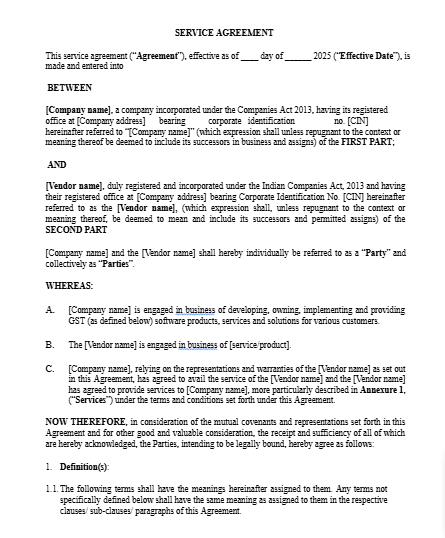Vendor Agreement in India: Meaning, Format, Key Clauses & Sample Templates
Vendor agreement contracts are not just administrative documentation. They are critical tools for managing business risks, resolving vendor disputes and ensuring operational resilience. In India's highly competitive business landscape, a legally precise agreement can be the difference between a confident partnership and costly liability.
This article dives deeply into the meaning, types of agreements, checklist, benefits, format and essential clauses for drafting strong vendor agreements.
What is a Vendor Agreement?
A vendor agreement is a legally enforceable contract that outlines terms and conditions for the supply of goods and services between an organisation (buyer) and its vendors (seller). Any such agreement in India must adhere to the legal framework mentioned in the Indian Contract Act of 1872.
Some of the essential factors that a contract between a buyer and a supplier should include are,
- Prices of products or services to be delivered
- Quantity to be delivered
- Minimum acceptable quality standards
- Delivery schedule
- Payment terms
Types of Vendor Agreements
Contractual agreements with vendors can be of different types based on the scope of work, business relationships, project types and payment terms. Some of the standard types of vendor agreements are:
- Master service agreement
- Work order or statement of work
- Fixed-price contract
- Cost-plus contract
- Time and material contract
- Service level agreement
- Distribution agreement
Master service agreement
This is a long-term agreement between an organisation and its vendors that broadly outlines future terms of business transactions. It can cover multiple projects and transactions but does not include any specifics. The purpose is to prepare a groundwork for all possible business relations. The key details of such agreements include terms of payment, rights to the ownership of intellectual properties, confidentiality terms, non-disclosure terms and laws applicable to future transactions.
Example: Contract with marketing agencies, IT services providers, etc.
Work Order (WO) or Statement of Work (SOW)
A SOW outlines the specifics of a particular project engagement. Such contracts are signed in conjunction with a master service agreement. The key items for a WO or SOW are details on the scope of work for the project, timelines, delivery milestones, pricing, etc. Such agreement derives broader terms and conditions from MSAs.
Example: Contracts for individual marketing projects, creative works with an ad agency.
Fixed-price contract
Such contracts are signed when a vendor agrees to deliver goods or services or both for a fixed sum of money, irrespective of the actual costs incurred by the vendor. The purpose is to outline the scope of work (SOW) in detail, as any alteration in the scope can have implications for the fixed-price costs.
Example: Agreement with a web development company for building a website
Cost-plus contract
The purpose of such vendor agreements is to outline the terms and conditions under which the buyer agrees to compensate the costs of deliverables, along with an additional sum as remuneration to the supplier. This type of agreement is also termed a cost-reimbursement agreement or indefinite delivery contract. The risk of cost overrun is minimal for vendors if the underlying conditions are met. However, as the risks of cost overruns are with the buyer, such agreements include a detailed scope of tracking and reporting project works.
Example: Contractual science experiments, contractual drug testing, emergency repair works, etc. Cost-plus contracts for emergency works are sometimes drafted as Letter Subcontracts.
Time and material contract
This type of vendor agreement is suitable for projects where the scope of work and duration of work are uncertain. The buyer agrees to pay for actual time spent on the project at a pre-specified rate and for the materials utilised. Pre-specified fixed rates offer more control over the project costs compared to cost-plus contracts. These agreements may also include a clause to establish the maximum limit to the project’s total costs.
Example: Construction projects, software development, projects requiring multiple customisations.
Service Level Agreement (SLA)
Service Level Agreements are components of MSA or SoW specifying performance expectations and quality standards. They also include penalties applicable for not meeting expectations or quality standards, and possible remedies.
Example: Contracts for third-party service providers managing IT infrastructure, business processes, healthcare services, logistics, etc.
Distribution agreement
Such contracts define the terms of agreement for vendors distributing products or services or both on behalf of a company. It can provide exclusive or non-exclusive distribution rights for specific or multiple territories and outline conditions for the nature of distribution, marketing support, payment terms and intellectual property protection clauses.
Example: Agreement with third-party distributors
Checklist for Preparing a Vendor Agreement
The following checklist can be useful while drafting a vendor agreement contract.
- Identify all parties (with their legal names) involved in the agreement
- The date from which the agreement comes into effect
- The purpose of the agreement
- Details on work or services or goods to be delivered
- Place of work or delivery of goods/ services
- Terms of contract termination
- Payment terms and applicable prices
- Performance or quality standards for work, service or goods to be delivered
- Non-disclosure, IP rights, confidentiality as applicable
- Miscellaneous information, including communication, severability, waivers, legal jurisdictions, etc.
Clauses to Include in a Vendor Agreement
A ‘clause’ in a vendor agreement is a section defining a specific set of terms, conditions, or obligations. In general, a vendor agreement contract includes the following clauses or sections.
- Contracting business parties
- Specification of goods, services or statement of work
- Payment modes, terms and conditions
- Billing process
- Rights, responsibilities and warrants
- Sharing of risks and terms of dispute resolutions
- Governing tax laws, acts
- Signatures of all parties and witnesses
- Annexures for attaching supportive documents
Format of Vendor Agreement
Here is a sample format for the vendor agreement below:

How to make Strong Vendor Agreements?
A strong or robust vendor agreement is essential for preventing vendor fraud, mitigating supply risks, avoiding unforeseen liabilities and building positive vendor relations with confidence. It is advisable to consider the following steps to prepare a robust agreement.
- Perform thorough due diligence on the vendor
- Identify organisational (internal) requirements with absolute clarity
- Draft the agreement based on vendor due diligence and internal requirements
- Consider the legal aspects (relevant laws and rules) while drafting the agreement
- Share the draft agreement with the vendor/supplier for reviewing
- Negotiate final terms and conditions
- Prepare the final agreement document
- Execute the agreement (signing by authorised signatories, witnesses and payment of stamp duty)
- Share the original copies of the agreement document with all the parties to the agreement
Taking advice and support from professional legal advisers with experience in drafting vendor agreement contracts is essential for preparing a strong vendor agreement.
Benefits of Vendor Agreement
The key benefits of drafting and signing a legally binding vendor agreement contract are,
- Formalisation of a business relationship
- Clarity about performance standards
- Legal protection against and mitigation of risks
- Cost and financial control over supplies


